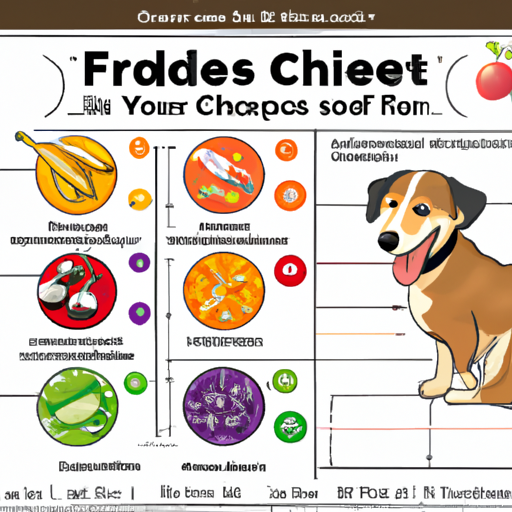As a loving caregiver to your furry friend, you’re always on the lookout for the best ways to keep them healthy and happy. One crucial aspect of their well-being is their diet. It’s not always easy to know what foods are safe for your dog to consume. So, let’s dive into the world of canine nutrition with this comprehensive “Foods Dogs Can Eat Chart.
1. Fruits Dogs Can Eat
Just like humans, dogs can benefit from a variety of fruits in their diet. Here are some fruits that are safe and beneficial for dogs:
| Fruit | Benefits |
|---|---|
| Apples | High in fiber and Vitamin A and C |
| Bananas | High in potassium and vitamins |
| Blueberries | Antioxidants, fiber, and phytochemicals |
| Cranberries | Good for urinary tract health |
| Oranges | High in Vitamin C |
| Pears | High in fiber and vitamins |
Remember, while fruits can be beneficial, they should make up no more than 10% of your dog’s diet.
2. Vegetables Dogs Can Eat
Vegetables can be a great source of vitamins and minerals for your dog. Here are some dog-safe vegetables:
| Vegetable | Benefits |
|---|---|
| Carrots | Good for dog’s teeth, high in fiber and beta-carotene |
| Green Beans | Full of iron and vitamins |
| Peas | Vitamins A, K, and B, along with iron, zinc, and potassium |
| Pumpkin | High in fiber and vitamin A |
| Sweet Potatoes | High in dietary fiber, vitamin B6, vitamin C, and beta-carotene |
3. Proteins Dogs Can Eat
Proteins are essential for your dog’s health. They support the growth and repair of your dog’s body. Here are some safe sources of protein for dogs:
| Protein | Benefits |
|---|---|
| Chicken | High in protein and can be easily digested |
| Turkey | Lean protein with nutrients |
| Fish (Salmon, Tuna) | Rich in omega-3 fatty acids |
| Eggs | High in digestible protein, riboflavin, and selenium |
4. Grains Dogs Can Eat
Certain grains can be a good source of fiber and help your dog feel full. Here are some safe grains for dogs:
| Grain | Benefits |
|---|---|
| Rice | Good for upset stomach, high in fiber |
| Oats | High in fiber, helps keep dogs regular |
| Quinoa | High in protein and essential amino acids |
5. Dairy Dogs Can Eat
Some dogs can tolerate dairy products, while others may have lactose intolerance. Here are some dairy products your dog might enjoy:
| Dairy | Benefits |
|---|---|
| Cheese | High in protein and calcium |
| Yogurt | High in protein and calcium, good for digestion |
Ensure the dairy products you give your dog are low in fat and do not contain any added sugars.
6. Nuts Dogs Can Eat
While many nuts are not recommended for dogs, certain types can be given in moderation:
| Nut | Benefits |
|---|---|
| Peanut | High in healthy fats, vitamin B6, and protein |
| Cashews | In moderation, can be an okay treat |
Always give nuts in small amounts, as they are high in fat and can lead to obesity.
7. Snacks Dogs Can Eat
Homemade snacks can be a healthier alternative to store-bought treats. Here are a few examples:
- Frozen yogurt and banana cubes
- Homemade peanut butter and oat cookies
- Chicken or turkey jerky
8. Foods Dogs Should Avoid
There are also certain foods that can be harmful to dogs. These include:
- Chocolate
- Grapes and Raisins
- Onions and Garlic
- Avocado
- Alcohol
Always consult with your vet before introducing new foods into your dog’s diet.
Frequently Asked Questions
Q: Can my dog eat all fruits and vegetables?
A: No. Certain fruits and vegetables, like grapes, raisins, and onions, can be toxic to dogs.
Q: How much protein does my dog need?
A: The amount of protein a dog needs can vary based on their age, size, and health. Generally, a dog’s diet should be about 20-30% protein.
Q: Can my dog be vegan?
A: Dogs are omnivores, and while it’s technically possible to feed them a vegan diet, it’s generally not recommended without expert guidance.
Q: What should I do if my dog eats something toxic?
A: If your dog eats something toxic, you should contact your vet or an emergency vet clinic immediately.
In conclusion, a diverse diet can contribute to your dog’s overall health. By understanding what foods are safe and beneficial, you can create a balanced diet that keeps your furry friend happy and healthy.



